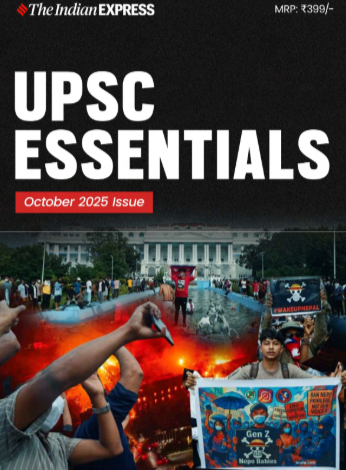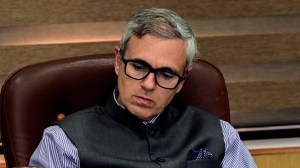UPSC Essentials : Daily Subject-wise quiz — History, Culture, and Social Issues (Week 12)
Are you preparing for UPSC CSE Prelims 2024? Check your progress and revise your topics through this quiz on History, Culture and Social Issues.
 Brush up your knowledge of History, Culture and Social Issues by solving the MCQs. Here is the image from Bahubali Mahamastakabhisheka Mahotsav that is believed to be one of the most important religious occasions for Jains who leave no stone unturned in ensuring a splendid execution of the ritual. (Wikimedia Commons)
Brush up your knowledge of History, Culture and Social Issues by solving the MCQs. Here is the image from Bahubali Mahamastakabhisheka Mahotsav that is believed to be one of the most important religious occasions for Jains who leave no stone unturned in ensuring a splendid execution of the ritual. (Wikimedia Commons) 🚨 This story is part of our special initiative for UPSC and other competitive exams. Look out for UPSC KEY on weekdays and UPSC Essentials everyday, Weekly news express with MCQs, Key Terms of the past week, Quizzes as well as The Indian Express 360° Upsc Debate, Society & Social Justice, UPSC Mains Practice, Art and Culture with Devdutt Pattanaik, UPSC Ethics Simplified, Experts Talk, and more. 🚨
UPSC Essentials brings to you its initiative of subject-wise quizzes. UPSC Daily Subject Quiz will cover all topics under UPSC Civil Services syllabus like Polity, History, Geography, Economics, Environment, Science and Technology, International Relations, and more. These quizzes are designed to help you revise some of the most important topics from the static part of the syllabus.
Each day, we will cover one new subject. Attempt today’s subject quiz on History, Culture and Social Issues to check your progress. Come back tomorrow to solve the MCQs on Environment, Geography, Science and Technology. Don’t miss checking the answers and explanations at the end of the quiz.
QUESTION 1
With reference to the Cripps Mission, consider the following statements:
1. The main goal of the mission was to persuade India to help the British war by providing resources, particularly soldiers, to their army.
2. The mission offered dominion status to India without a definite time frame.
Which of the above statement(s) is/are correct?
(a) 1 only
(b) 2 only
(c) Both 1 and 2
(d) Neither 1 nor 2
QUESTION 2
Consider the following statements:
1. It is a Jain pilgrimage centre located in Karnataka.
2. It has two hills, Chandragiri and Vindyagiri.
3. The statue Gommateshwara, which is located near this place is dedicated to the Jain God Bahubali.
Which of the following places is referred to in the above lines?
(a) Ranakpur
(b) Nareli
(c) Varur
(d) Shravanbelagola
QUESTION 3
With reference to the Ashtadhyayi, consider the following statements:
1. It is a linguistics text that set the standard for how Sanskrit was meant to be written and spoken.
2. It is an ancient text written by the scholar Panini.
3. It delves deep into the language’s phonetics, syntax and grammar.
How many of the above statements are correct?
(a) Only one
(b) Only two
(c) All three
(d) None
QUESTION 4
Which state has received the Geographical Indication (GI) Tag for the Khola Chilli?
(a) Kerala
(b) Goa
(c) Gujarat
(d) Karnataka
QUESTION 5
He was appointed secretary of the Asiatic Society. Between 1834 and 1837, his most notable feat was the decipherment of the Brahmi and Kharoshthi scripts. The identification of Piyadasi with Asoka and the contemporary kings described in his Rock Edict XIII allowed for the establishment of a precise chronology for Indian history.
The above-mentioned lines refer to
(a) James Princep
(b) Alexander Cunningham
(c) John Hubert Marshall
(d) Hasmukh Dhirajlal Sankhalia
ANSWERS TO MCQs
1. (c)
FYI:
— In March 1942, a mission led by Sir Stafford Cripps arrived in India to meet leaders of the Congress and the Muslim League. The idea was to secure India’s whole-hearted support in the war, and the return offer to Indians was the promise of self-governance.
— The sole purpose of Cripps Mission was to convince India to support the British war by supplying the wherewithal to their army, soldiers in particular. Hence, statement 1 is correct.
— The mission offered dominion status to India in return after the war was quite vague and without a definite time frame. Hence, statement 2 is correct.
— Indian Leaders felt deceived when the Mission announced that the British would hold complete control over Indian affairs in the mean time.
— There was a provision for the partition of India, which was not acceptable to the Congress.
— Mahatma Gandhi quipped this mission as a ‘post-dated cheque on a bank largely failing’.
Therefore, option (c) is the correct answer.
(Other Source: pib.gov.in)
2. (d)
FYI:
— Shravanabelagola, is a Jain pilgrimage centre located near Channarayapatna of Hassan district in Karnataka, about 144 kms from state capital Bengaluru.
— Shravanabelagola has two hills, Chandragiri and Vindyagiri.
— The Gommateshwara Bahubali statue, located on the Vindyagiri Hill is one of the most important pilgrimage destinations for Jains. It is dedicated to the Jain God Bahubal.
— It was built around 983 A.D. and is one of the largest free-standing statues in the world.
— The place is famous for Bahubali Mahamasthakabhisheka Mahotsav. The Mahamastakabhisheka festival is held once in 12 years, when the Gommateshwara statue is anointed with milk, saffron, ghee, etc.
Therefore, option (d) is the correct answer.
3. (c)
FYI:
— Ashtadhyayi’ is a linguistics text that set the standard for how Sanskrit was meant to be written and spoken. Hence, statement 1 is correct.
— It was written more than 2,000 years ago by a scholar Panini towards the end of the 4th century BC. Hence, statement 2 is correct.
— It delves deep into the language’s phonetics, syntax and grammar. Hence, statement 3 is correct.
— It also offers a ‘language machine’, where you can feed in the root and suffix of any Sanskrit word, and get grammatically correct words and sentences in return.
— To ensure this ‘machine’ was accurate, Panini wrote a set of 4,000 rules dictating its logic.
Therefore, option (c) is the correct answer.
4. (b)
FYI:
— Khola Chilli is a famous variety of Chilli grown on the hill slopes in Canacona Taluka located in the South District of Goa. It is named after Khola village being grown exclusively in Khola village.
— Chilli is known for its taste and colour. The Khola chilies are attractive red (brilliant red) in colour with long in length. It is medium pungent in taste.
Therefore, option (b) is the correct answer.
(Source: search.ipindia.gov.in)
5. (a)
FYI:
— In 1833 James Prinsep became the secretary of the Asiatic Society.
— The most eventful achievement of James Princep was the decipherment of the Brahmi and Kharoshthi scripts between 1834 and 1837.
— The identification of Piyadasi with Asoka and the contemporary kings mentioned in his Rock Edict XIII enabled to fix a clear chronological bench mark for Indian history.
— The excavations at Manikyala stupa (now in Bangladesh) in 1830 and in sites in the Indus – Jhelum region in 1833 and 1834 revealed Buddhist relics and through coins a new ruling family, the Kushanas was identified.
Therefore, option (a) is the correct answer.
(Source: asi.nic.in)
New initiative for UPSC Mains
UPSC CSE Mains 2023 season has begun. Are you ready for it? UPSC Essentials brings to you its new initiative for the practice of Mains answer writing. Mains Answer Writing will cover essential topics of static and dynamic parts of the UPSC Civil Services syllabus covered under various GS papers. This answer-writing practice is designed to help you as a value addition to your UPSC CSE Mains. Try it out!
UPSC Essentials: Mains answer practice — GS 1 (Week 1)
UPSC Essentials: Mains answer practice — GS 1 (Week 2)
UPSC Essentials: Mains answer practice — GS 1 (Week 3)
UPSC Essentials: Mains answer practice — GS 1 (Week 4)
UPSC Essentials: Mains answer practice — GS 2 (Week 1)
UPSC Essentials: Mains answer practice — GS 2 (Week 2)
UPSC Essentials: Mains answer practice — GS 2 (Week 3)
UPSC Essentials: Mains answer practice — GS 3 (Week 2)
UPSC Essentials: Mains answer practice — GS 3 (Week 3)
UPSC Essentials: Mains answer practice — GS 3 (Week 4)
UPSC Essentials: Mains answer practice — GS 3 (Week 5)
UPSC Essentials: Mains answer practice — GS 4 (Week 2)
UPSC Essentials: Mains answer practice — GS 4 (Week 3)
The UPSC Essentials Indian Express is now on Telegram- Indian Express UPSC Hub. Click here to join our YouTube channel and stay updated with the latest updates.
Note: Catch the UPSC Weekly Quiz every Saturday evening and brush up on your current affairs knowledge.
UPSC Magazine

Read UPSC Magazine







- 01
- 02
- 03
- 04
- 05
























